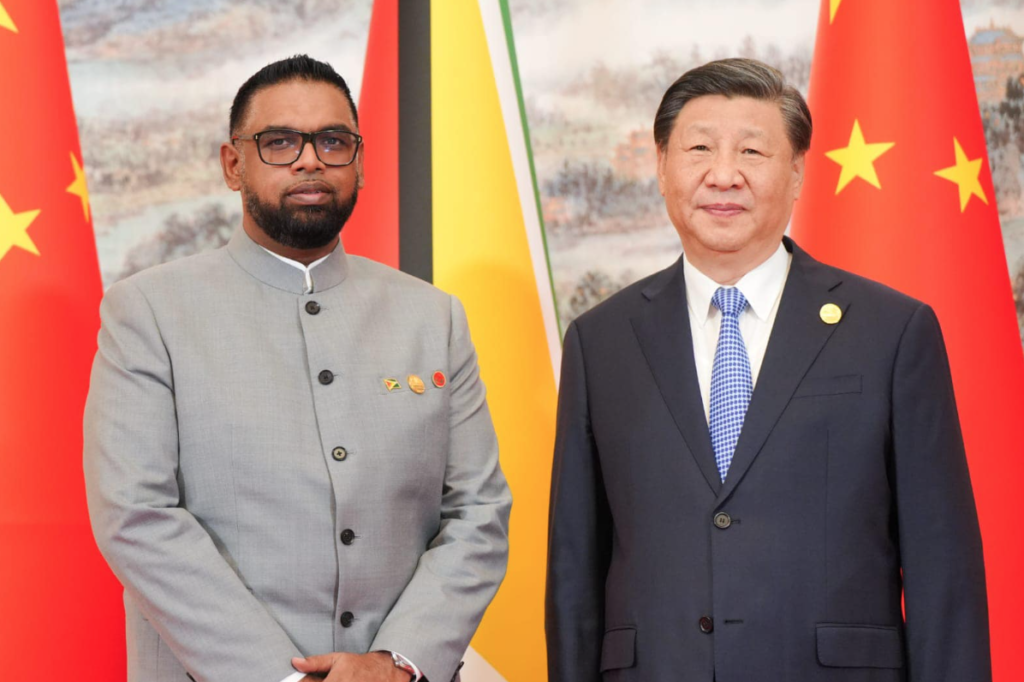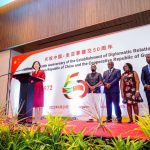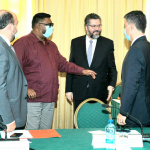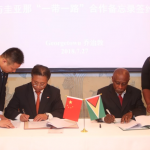
Five years after Guyana signed onto China’s Belt and Road Initiative, President Irfaan Ali has signaled the country’s willingness to conclude negotiations on the Initiative’s Joint Action Plan as he wrapped up an eight-day visit to the People’s Republic of China.
The Joint Action Plan would guide the implementation of the Belt and Road Initiative, and would ultimately see enhanced cooperation in five main areas: policy coordination, facilities connectivity, trade and investment, financial integration and people to people interaction
In his meeting with China’s President, Xi Jinping, President Ali recommitted to the Belt and Road Initiative, even as he welcomed a Memorandum of Understanding (MoU) with China for the creation of an Investment and Economic Cooperation Working Group.
“With reference to the Memorandum of Understanding on Cooperation within the Framework of the Silk Road Economic Belt and the Twenty First Century Maritime Silk Road Initiative, signed between the two sides on July 27, 2018, the Guyana side expressed willingness to discuss and conclude the Joint Action Plan on Promotion of the Belt and Road Initiative with the Chinese side,” a joint statement issued by the two countries on Sunday read.
According to the statement, President Ali also met with the Premier of the State Council of the People’s Republic of China, Li Qiang, and during those meetings with the Chinese President and the Premier, he applauded China on several of its initiatives including Belt and Road Initiative, the Global Development Initiative, the Global Security Initiative, and the Global Civilization Initiative.
The Guyanese Head of State, also used the opportunity to express gratitude to President Xi for China’s support in Guyana’s economic development, including in the areas of infrastructure.

According to the statement, both sides committed to deepening economic ties, including enhanced trade and investment promotion, and to expanding cooperation in areas such as infrastructure development, agriculture, health, energy and education.
“Recognizing the positive role of infrastructure development in generating economic growth and alleviating poverty, both sides agreed to expand collaboration in this area. Both sides agreed to investigate the prospects for collaboration in the development and construction of critical infrastructure projects, leveraging China’s experience, expertise and finance capacity,” a section of the statement read.
The two sides said they remain very cognizant of the value of trade and investment in strengthening economic ties, and as such, they remain committed to creating a favorable business environment to facilitate bilateral trade and investment. In this regard, they agreed to explore the possibility of expanding trade in a variety of industries, including agriculture, energy, mining, manufacturing and services, even as they work to drive economic development in both countries.
For its part, the Chinese leaders applauded Guyana on its election to the UN Security Council as a non-permanent member, and its constructive role in regional and international affairs, especially on food, security, regional integration and China-CELAC cooperation.
But weighing in on the issue, President Ali spoke of the need for developed and developing countries to place greater focus on the promotion of food, climate and energy security for sustained development.
The leaders also discussed the implementation of the 2030 Agenda for Sustainable Development, and in doing so, expressed the firm conviction that greater international mobilization was critical for bridging the economic divide between developed and developing countries, strengthening developing countries’ capacity to respond to shocks, and for reducing the incidence of poverty in the developing world.











You must be logged in to post a comment Login